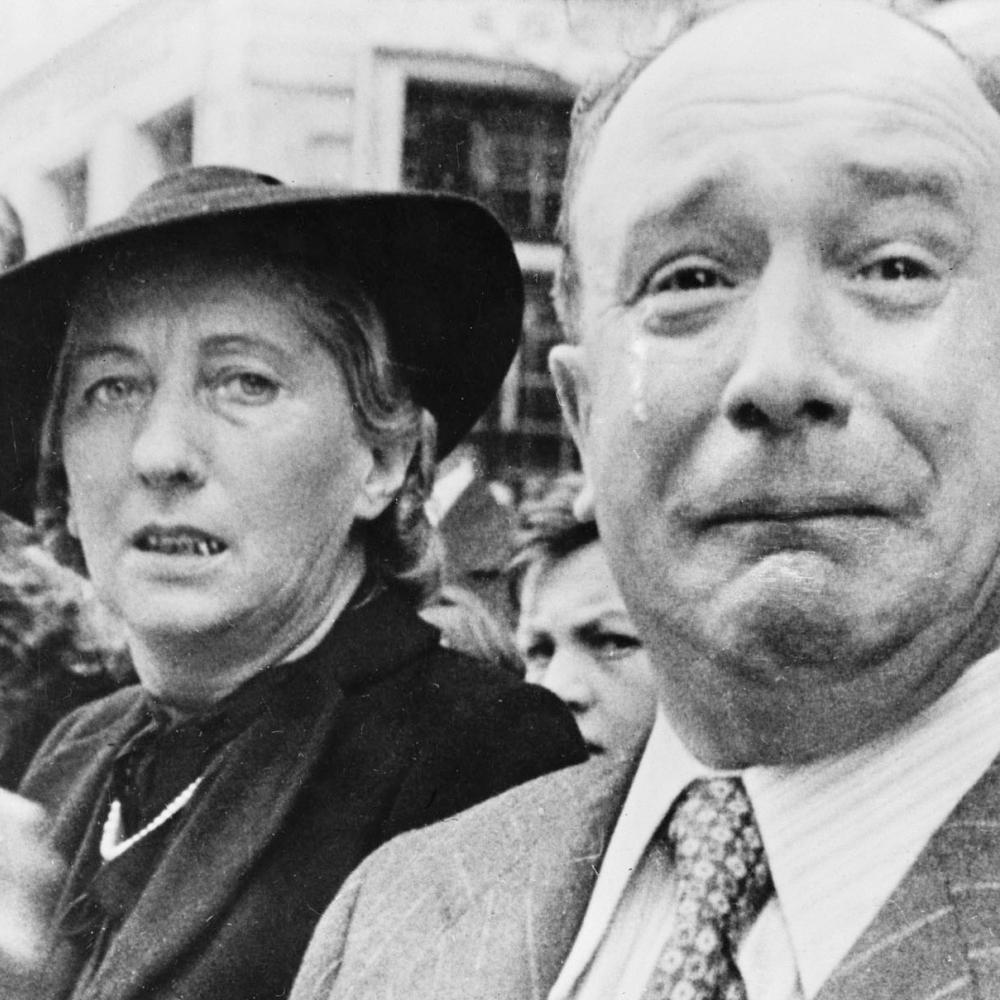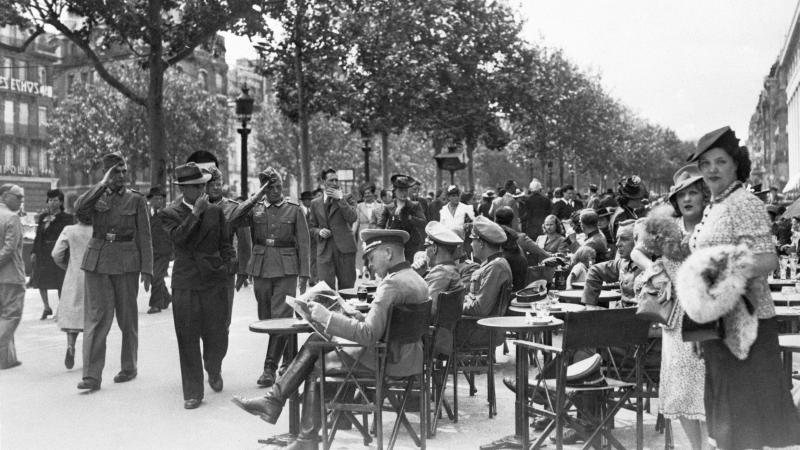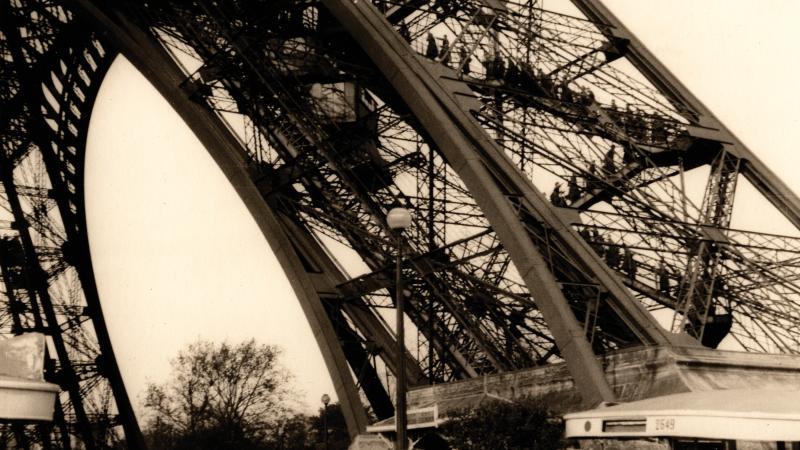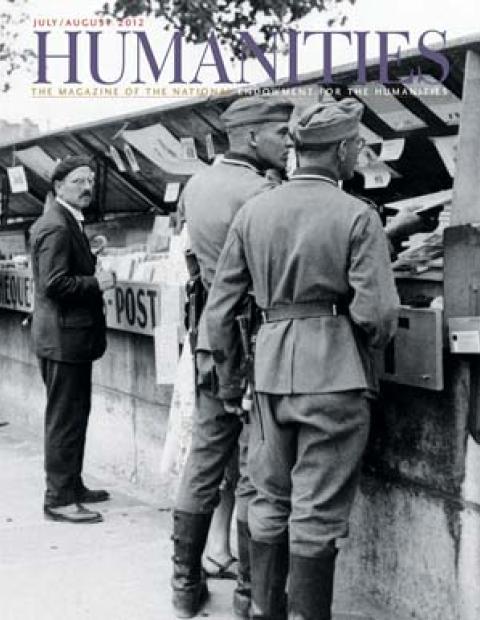On the morning of May 15, 1940, five days after Germany invaded the Netherlands, Belgium, and France—and five days after Winston Churchill became prime minister of the United Kingdom—the French prime minister, Paul Reynaud, called his British ally to tell him that France was lost. Churchill did not believe it was possible. “Surely,” he said, “it can’t have happened so soon.”
The next day, Churchill, who was to be an intrepid traveler throughout the Second World War, arrived in Paris to confer with French political and military authorities. As French diplomats burned heaps of documents on the lawns of the foreign ministry, the French commander in chief, General Maurice Gamelin, with the help of a large map “purporting to show the Allied front”—which was, of course, changing by the minute—offered a brief, disheartened presentation. When Gamelin stopped talking, there was, Churchill recounts, “a considerable silence”—a silence finally broken by Churchill himself, who asked, “Where is the strategic reserve?” first in English, and then, since there was no immediate answer, in French. Gamelin answered, “Aucune” (There isn’t any).
Julian Jackson, in a recent scholarly analysis of the French disaster, The Fall of France: The Nazi Invasion of 1940, argues that the Battle of France was lost on May 13. That was the day the main German invasion force broke through near Sedan and crossed the river Meuse, and the day the French failed to mount a counterattack while the bridgehead was still vulnerable. Once the Germans had successfully crossed the Meuse, they streaked westward. On May 15, they split the French and British forces, trapping the strongest French divisions and nearly all of the British troops in Belgium, where the Allies had advanced in the mistaken expectation of meeting the main invading force.
Before Churchill arrived on the morning of May 16, Gamelin had already told the French defense minister that he had nothing to interpose between the German invaders and Paris. The French high command, wrong-footed from the start, was surprised by the Germans’ rapid move west; they expected them to head for Paris, not for the Channel coast. The military governor of Paris, General Pierre Héring, had recommended that the government leave the capital, but it decided to stay in order to avoid causing civilian panic. As a result, panic was contained for a few weeks, affecting, at first, mainly elements of the government and the military high command. The civilian population of Paris did not know how serious the situation was until the government precipitously abandoned the city and moved to Tours on June 10. Five days later it moved again, this time to Bordeaux. These moves were accompanied and followed by a civilian exodus—six to eight million people fled south between mid-May and mid-June. In Jackson’s words, the exodus “[transformed] the events of 1940 from a mere military defeat to something approaching the disintegration of an entire society.”
A. J. Liebling, war correspondent for The New Yorker, had been in Paris since the second week of October 1939 reporting on the uneasy lull between the declaration of war on September 3, 1939, and the beginning of combat on May 10, 1940, a lull that the French called the drôle de guerre—the joking war—which became known as the Phoney War in English.
In The Road Back to Paris, Liebling offers a day-by-day account of the onset and spread of panic. News of the May 13 breakthrough at Sedan reached Paris two days later. It was, Liebling says, the beginning of fear “for a few Parisians who were both pessimistic and analytical,” but on May 15 “even the neurotic clientele of the Ritz and the Crillon bars had been calm.” Panic, in Liebling’s account, began on Thursday, May 16, but “it affected . . . only the most highly sensitized layers of the population: the correspondents, the American and British war-charity workers, and the French politicians.”
“As late as . . . May 27, people in Paris still believed that the Allies stood a chance of closing the gap between their southern and northern armies.” The next day the king of the Belgians surrendered his army, and Belgium left the war, exposing French and British forces in Belgium to encirclement and destruction. The same evening, Liebling had dinner with two American friends. “Although all three of us knew that the war was lost, we could not believe it.” The war probably had been lost for two weeks by then, but almost no one in Paris believed it.
There is now a vast historical literature on the fall of France, supplemented by a large number of personal accounts, which offer a sense of how the defeat of an army, the collapse of a government, and the partial disintegration of a society affected individual lives. Julien Green wrote one of these personal accounts in July 1940. He began it in Lisbon while he waited for a berth on a passenger liner sailing to New York. He continued it on board the Excambion and completed it in Baltimore while events and the emotions they prompted were fresh in his mind.
In the spring of 1940, Julien Green was thirty-nine years old. He was an American born in Paris. He spoke French before he spoke English, attended a distinguished Paris lycée, Janson de Sailly, and, after sitting for the French baccalaureate in 1917, served as an underage volunteer ambulance driver, first for the American Field Service and then for the American Red Cross during the First World War. After the war, he spent three years (1919–1922) at the University of Virginia at the invitation of his uncle—his mother’s brother—Walter Hartridge. It was his first direct encounter with the United States. He discovered the South, where both his parents had been born, and discovered his homosexuality. He returned to France in 1922, where, after a false start as a painter, he began his career as a French writer, and by 1927 had established himself in the world of French literature.
Green is among the most unusual American writers of the past century—unique in having a major reputation as a francophone author. Although he first found his public as a novelist, much of his reputation has come to rest on the journal he kept for over seventy years, from 1926 until shortly before his death in 1998. “Biography,” he wrote, is “superficial and exterior”; his journal is neither. It is discontinuous and penetrating. If it offers only fragments of a life, these fragments look inward and over the course of many years reveal a rich and complex character, a person with a real intellectual life, a real spiritual life, and a deep attachment to a world that he knows is essentially illusory—but a world he loves all the same. It is a lifelong record of combat between carnal illusion and spiritual reality. France, as the guardian of western civilization, is a constant presence. So are the French language and the English language. So is Paris, where Green took long walks until extreme old age forced him to stop. No one has ever captured the love of place on the page the way Julien Green has captured his love for Paris.
Pascal says there are some places in Paris that you have to call Paris, and others that you have to call the capital of the kingdom. It isn’t the capital of the kingdom that I miss; it’s the little rue des Ciseaux behind Saint-Sulpice; it’s the stamp dealer at the corner of the rue Bonaparte and the quai; it’s the little café on the avenue Victor-Emmanuel. When I think of the color of the Seine on a beautiful winter morning or of the shouts of children in the Luxembourg Garden, so many memories come back to me that I feel as if I’m there and that I think I’m here only as a result of a sort of hallucination.
In the published version of this remarkable document there is just one interruption longer than a few weeks. That interruption begins in March 1939 and ends on July 21,1940, when he resumes his journal in Baltimore, “in exile.”
I will be forty years old in a little more than a month, and I find myself in just about the same circumstances I was in at twenty—fewer illusions and less enthusiasm—that is, altogether uncertain of the future. I’m a French writer and can no longer live in France, at least for the moment. As a result, from now on I’ll have to write in English. Although I’m certainly not unknown in this country, I have the feeling that I’ll have to start all over again. The thought doesn’t discourage me; instead it exhilarates me. The loss I’ve suffered isn’t granted to everyone, and perhaps it is a great, a tremendous favor to be uprooted, to see everything one possesses snatched away.
He had taken the notebooks covering the missing months of 1939 and 1940 with him when he left Paris even though he expected to return. The journal was then in its fifteenth year, and it had become part of his daily routine. When events convinced him that he could neither return to Paris nor remain in France under Nazi occupation, he destroyed these notebooks—he believed they could compromise him and compromise certain French friends if they fell into the wrong hands—before crossing the bridge at Hendaye into Spain on June 20, just two days before France signed the armistice.
The bound notebook in which he wrote his account of the fall of France as he experienced it and in which he offers a narrative of his own departure from France was apparently lost sometime after 1946 and not rediscovered until 1991. It was finally published the following year as La fin d’un monde: juin 1940 (The End of a World: June 1940). By that time, Green had been a prominent author in France for more than sixty years but was largely forgotten in the United States.
If Liebling’s account of the fall of France is not as widely read as it deserves to be, it is nevertheless easily accessible. It was written by an American reporter for American readers, and although it sold only modestly when it was first published in 1944, it has remained—with interruptions—tenaciously in print and is beginning to be considered part of the classic American literature of the Second World War.
Julien Green’s account of his departure, written in French in 1940, took the place of the journal that he said he hadn’t had the heart to keep at the time. Unlike the journal, La fin d’un monde is a continuous narrative written after the events it recounts. Step by step, it recalls the way events spun entirely out of Green’s control and took over his life. It recounts how confusion, disbelief, hope, anxiety entered his life “like the passage from nightmare to reality, which was only a waking version of the nightmare.” When the news reached him that Paris had been bombed, he felt he was facing “something that was at once impossible and inevitable.” So many contradictory reports were in circulation that his first reaction was to believe that the news of the bombardment was false. Minute by minute, what he imagined to be a brief absence from Paris, a temporary expedient keeping him out of harm’s way, was becoming an unplanned departure from a nation on the verge of disintegration and a frantic scramble to rescue his closest and most vulnerable friend from political reprisal.
Green was one of those Parisian civilians with connections to that highly sensitized layer of the population of whom Liebling speaks. Such people knew that things were desperate as early as May 16, when refugees from Belgium began to arrive and cities in Northern France—areas that had been occupied during the First World War—began to empty.
Green’s sister, Anne, was working as a volunteer attending to Belgian refugees. Although she was not in a state of panic, she understood how vulnerable Paris was. At her insistence—and against his own inclination—Green left his apartment on May 18 and took a train to Pau, where a family friend with a villa just outside the city received him. Looking back on events the following September from Baltimore, he writes:
Last spring, I left Paris certain that I would be coming back soon. Shortly before leaving, I lingered for a few minutes in my library with my sister, and we joked with one another. In leaving this room, I didn’t for a moment have the feeling that I would never see it again.
He left behind more than an apartment and a library; he left behind a way of life, a career, a cultural identity, and France itself—a country that, he said, “had, up to 1940, given me everything.”
During his first days at Mary Caumartin’s villa just outside of Pau in southwestern France, not far from the Spanish border, he and his hostess spent hours listening to radio broadcasts, trying to get a sense of what was happening. Their confidence in the success of the Allied forces was still absolute, he says. “To doubt for a single moment would have seemed like a betrayal.” Although he had listened to his sister and got out of Paris before the city was abandoned by the government and by almost every civilian who had access to transport, it wasn’t because he thought that France was lost. His sister had probably worried that the city would be bombed, as in fact it was on June 3—906 casualties, including 254 dead, 195 of them civilians—not that Paris would be occupied. Liebling recounts how people in Paris managed to find reasons to be encouraged. Green went through a similar experience in Pau.
[W]e were all blind, and the power of analogy was so strong even for the most skeptical that we obstinately believed in the rapid defeat of Germany. The idiocy of propaganda had found its path: the departure of the government was a wise measure required by the risk of another bombardment and the desire to preserve one of the most beautiful cities in the world by declaring it open. And hadn’t the government left Paris in September 1914? This reminder was reassuring instead of being disquieting because we were so sure of being part of a sort of reenactment of the Great War with a decisive victory before summer.
One of the most painful aspects of living through a horror that invades every aspect of normal life is the energy spent in denial, the energy spent in finding reasons to hope that what is happening isn’t happening. Green offers a testimony that is both immediate and detached, intensely personal and clinically analytic, as if Rembrandt’s Dr. Tulp were giving his anatomy lesson using his own body.
If Green was a refugee in Pau, he was a fortunate refugee. In the final days of the Third French Republic, Spain closed its border to French nationals who lacked a visa to another country, but Green was an American and an unusually well-connected American. Aside from the emotional shock and sense of loss involved in being unexpectedly uprooted, he faced no practical problem either in leaving France or entering the United States. His cousin, Nan Williams, was ready to receive him in her large and comfortable house in Baltimore, but “there remained the delicate problem of Robert.”
Robert was Robert de Saint Jean, one of Green’s closest friends and the deputy chief of staff to the French minister of information. Joachim von Ribbentrop, the German foreign minister, about whom Saint Jean had written in the French press, bore him personal malice. Saint Jean called Green from Bordeaux as the government was disintegrating, and Green decided he could not leave France without him. La fin d'un monde recounts how he succeeded in getting his friend into Portugal, and then secured the visa that allowed him to enter the United States. Once that frantic drama was over, Green began to survey the damage.
[O]n 3 September 1939 [when France and Britain declared war on Germany] Europe had pressed the barrel of a gun to its temple; on 10 May 1940, it pulled the trigger. It’s all over. France no longer exists: in a few weeks a thousand years of culture has been engulfed.
The pain of loss and exile recurs in journal entries throughout the war years:
I know very well that we have no cause to complain since we are suffering from neither cold nor hunger, still the uncertainty of tomorrow, the agony of the possible victory of our enemies, the grief of exile, our ignorance of what has become of our friends, all this amounts to a heavy burden that we have to take up every morning and carry on our backs until night. These are painful times, and the security in which we live changes nothing. Last night we talked about the future that looks so murky and menacing. . . . Will we ever see France again? And what France?
As grim as the situation looked to him, things went much better than he could have imagined. In the summer of 1940, General Marshall told Liebling in an interview that the United States had “‘the possible equivalent of three divisions’ . . . ready to fight and that included the garrisons of the Canal Zone and Hawaii.” Four years later the United States led the largest amphibious invasion in history and drove the Germans out of France. On August 25, 1944, a French armored division liberated Paris—a Paris that was, physically at least, remarkably intact.
Green returned to France in late September 1945. Paris was cold and undernourished; housing was scarce; electricity was sporadic. He was temporarily put up by the American embassy in a hotel the army had requisitioned, but finding an apartment was frustratingly drawn out and difficult. On November 12, still in the hotel, he discovered that a friend had stored all his furniture in a garage in 1941.
He gave me the keys. I opened the door and lit a candle. It was all there, filling the garage to the ceiling, forming an enormous block in which I could distinguish by the glow of the little flame, here a table, there a couch, over here a box, over there a file full of letters . . . I looked at it, immobile, and my heart stood still. . . . So many happy memories filled my mind . . . I would come back another time. Today this first glance was enough.
His books had been rescued, too.
Green’s narrative of exile and return, unexpected catastrophe and unexpected restoration, divided as it is between La fin d'un monde and the journal entries he made between July 1940 and the end of 1945, deserves to be recognized as the masterpiece of memoir and meditation that it is. Like so much of his writing, it offers an astonishing freshness of vision in its presentation of everyday experience and a vision that extends to those familiar miracles that are easily overlooked, beginning with language.
In 1971 Green was elected to the French Academy to succeed François Mauriac. The Academy, founded in 1635, is the official guardian of the French language and therefore is charged with the daunting task of defending the language from its speakers. Green was the first member, ever, who was not a French national. He loved the language, of course, and had made it his own. His form of defending it was to rescue it from lifeless routine by bringing to it what he calls “the genius of childhood”:
to see everything for the first time, to look at a leaf as if it were something never before seen . . . that is the only way in which it can show itself to us in all its newness. The faculty of astonishing ourselves constitutes the genius of childhood, so quickly blunted by routine and education, and no one will ever be able to put words to proper use if he doesn’t know a little how to see the world with Adam’s eyes. In art, truth is in surprise. When one looks at a stone as a mountain in miniature, one begins to see things as they are.
Julien Green’s narrative of the fall of France, the occupation, and the liberation is the mountain in miniature.




